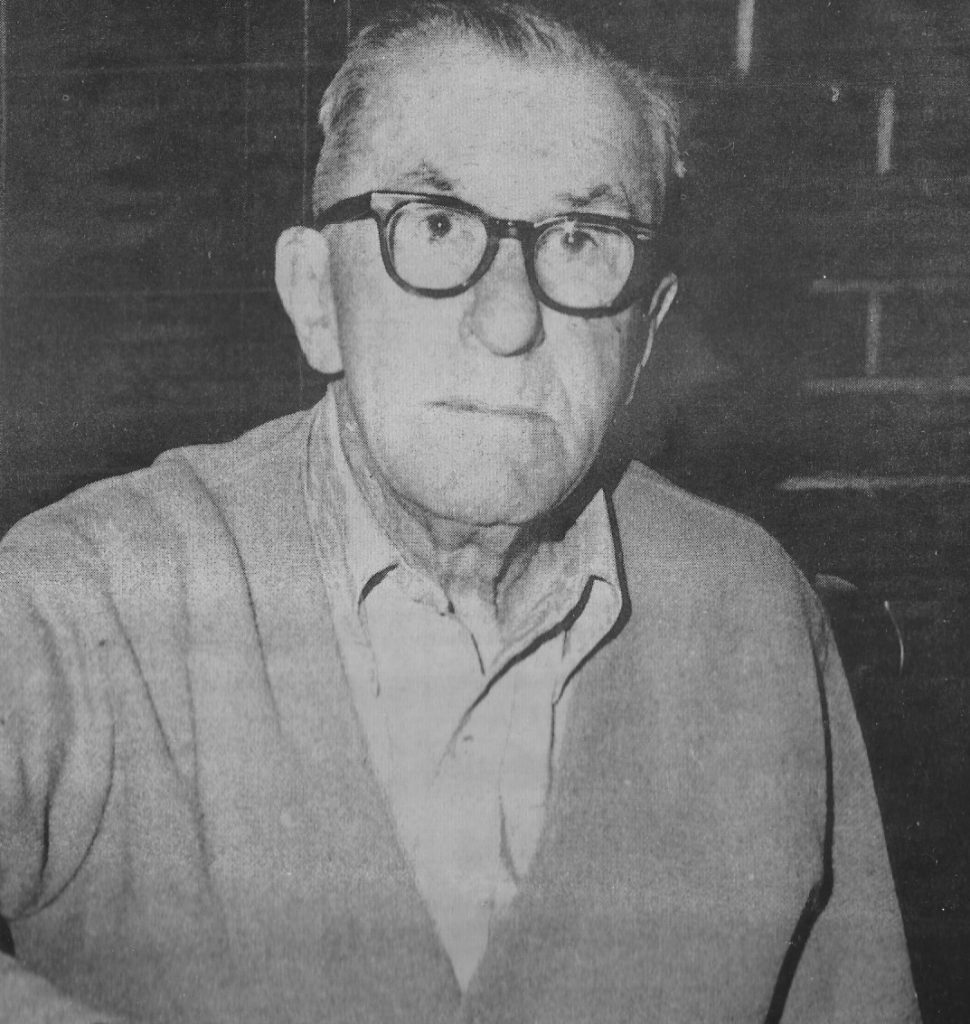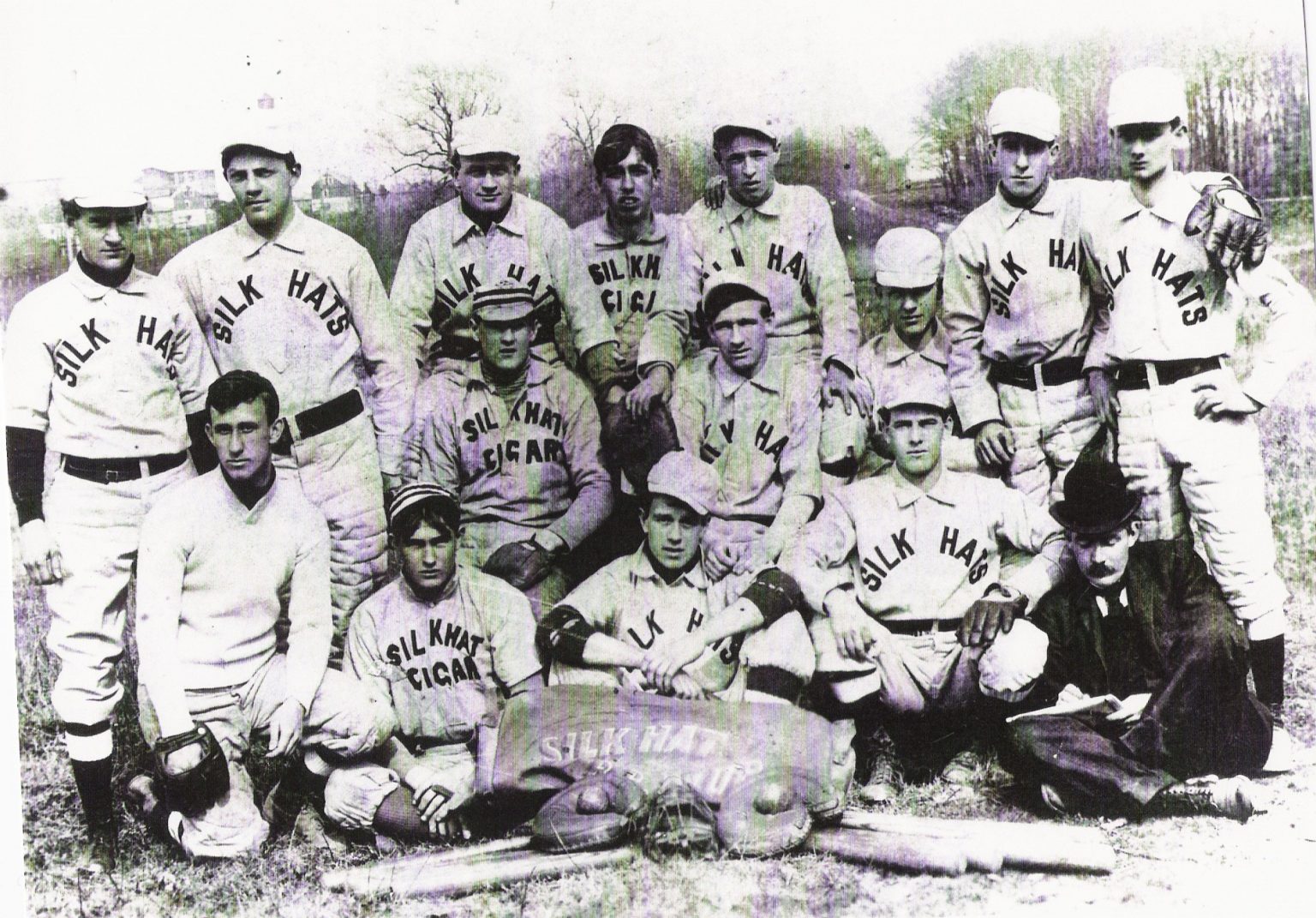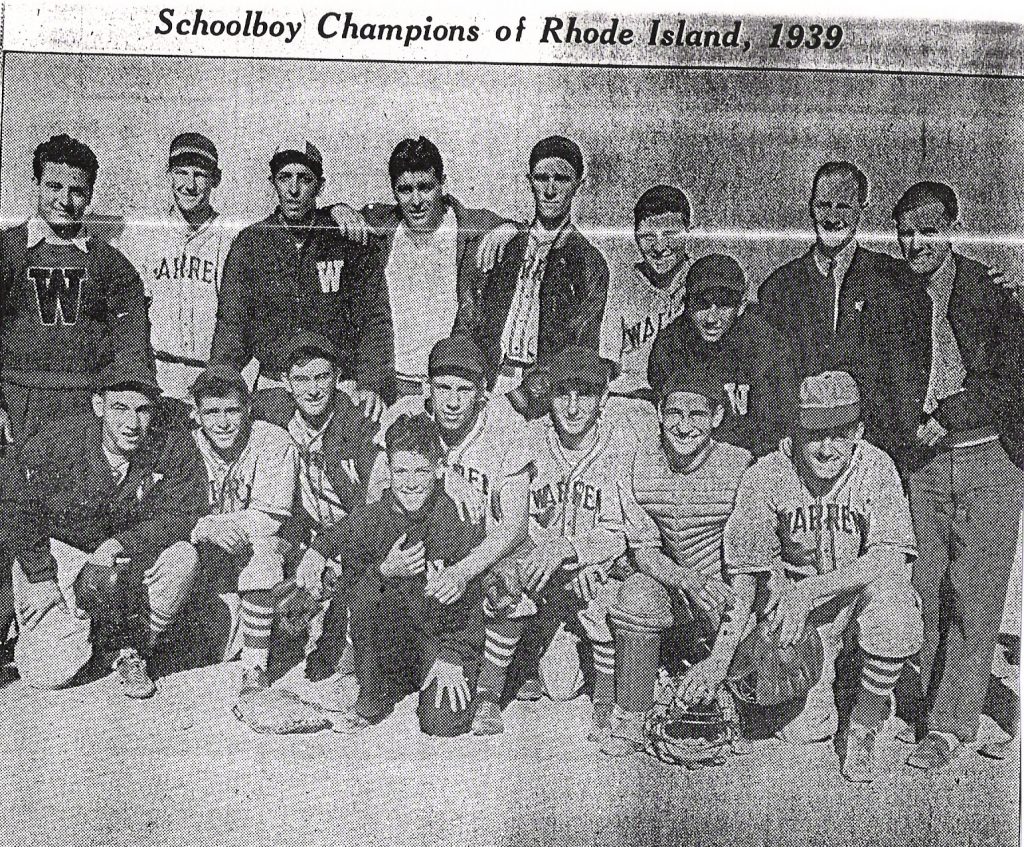1972 Beany Ryan Interview
Warren Times Gazette April 26th, 1972
Beany Ryan discusses baseball in the early Years of the twentieth Century
One of Beany Ryan’s boyhood memories is shaking hands with Nap Lajoie, a major league baseball great at the turn of the century. This incident gave young Beany an early interest in baseball, an interest he has maintained all of his life.
Last week, Beany Ryan turned 87. There is ample time for reminiscing now, and most of his memories are happy ones. The old gang, the boys who grew to manhood with him, are mainly gone. But for Beany the memories never die, and he recalls the names, dates and places from the past with the quickness of a man half his age.
Beany was born in Barrington and spent the first five years of his life living on Sowams Road. Then it was a short three years in Fall River before moving to Warren. But those Fall River years were important because Beany started going to baseball games there at the park on Bedford Street.
A gang of boys stood outside the Bedford Street park one afternoon waiting to see Nap Lajoie, who was born in Woonsocket and was quite a local favorite.
When Lajoie came to the park he waved to all the kids. Beany adds, “Then he started shaking hands with some of us. I didn’t wash my right hand for a week.
Shortly after moving to Warren, Beany’s mother died and a few years later his father passed away. For two or three years, Beany worked with his uncle Johnny on the fruit wagon, peddling fruit throughout Bristol County. Then for several years he worked summers on Ed Morrissey’s farm on Sowams Road in Barrington and in a jewelry firm during the winter months.
“This was a small farm, “ Beany recalls. “ Just one cow and one horse. The hours were long and there was no time to play ball. So I went to work at Waterman’s Mill, which later was sold and became Berkshire’s. I stayed there 37 years.”
There was time for baseball now, especially on weekends. Beany recalls some of the old group—Biddy Smith, Howie Martin, and Fred LaFlamme. This was just informal play, but later Jack Hanley put a team together, a team that included Johnny Simister, Joe Wiley and St. Onge.
Still later, the Warren Town team was formed with Biddy Smith as manager. This group included Curt Chappelle, Jim Parks, and Charlie Kelley. Beany remembers how this club became known as the Silk Hats.
“One July 4th, we were scheduled to play Bristol”, Beany says. “Jack McDonough, who ran the Warren Hotel, told me that if we beat Bristol he’d buy us all uniforms. He was an agent then for the Silk Hat Cigars.”
“Well we beat Bristol that day. I remember we brought all the brooms we could find in the town and paraded through the streets. Jack McDonough kept his promise. He bought us uniforms with “Silk Hats” written across the jerseys.”
The team played its home games where the present Warren High School ( later Kickemuit Middle School) field is located, with most of the action on Sunday afternoons. Then the team played at the Power House off Park Street, later moving to the Franklin Street field, which became known as the Piggery.
When land development took away the field, the action shifted to an open pasture behind the Taylor Box Factory on Child Street. There was even a grandstand built at that site. Two or three years later Jamiel’s Park became available and the local games were played there for many years through the 1920s and into the early 1930s.
“Eddie Higgins and Jigger Higgins had good teams in town during the 1920s,” Beany says. “They imported some fine players including Beans Baker and Joe Barry. I was a coach for them one year.”
“One year the Higgins boys brought in George Sisler’s All-Stars to Warren with a $1,000 guarantee. We put posters all over Swansea, Rehoboth, Barrington and Bristol—but we only made $900 that day.
“Warren was a great baseball town. The Manufacturers League played on Sundays, and during the week we had a Twilight League. We had a ball game pretty nearly all the time.”
There were four teams in the Twilight League at the time; St. Mary’s, St. John’s, the Old Timers and Narragansett Electric. Beany was joined by Jim Parks and Howie Martin on the Narragansett Electric club. St. Mary’s had some good ball players, including Eddie Maguire, Eddie Conrick and Biddy Smith.
“When the fall came, we started playing soccer, “ Beany says. “This was a big sport around here when I was young. And Warren had a good team. We had Bob Ainsworth tending goal, Jimmy Parks and Johnny Simister playing defense and men such as George Shakeshaft, Zip Urban, Joe Wiley, Albert Phillips, and Ned Creach.
The 87-year-old rattled off these names as if the games were played only a few years ago instead of better than half a century back.
When you talk baseball in Warren, and Beany Ryan likes few things better, you have to mention the Little World Series with Bristol. For many years this series was the biggest of its type in New England. Many of the major league stars would come to town – for free — to play for these two rivals. (Beany later said that they were paid)
Beany managed Warren a number of times back in the 1920s. One year, his opposite was Dr. Johnny Murphy of Bristol. No time, effort or expense was spared to arrange these games. The meetings were held in the old Providence Journal building in Providence.
At one of these meetings, it was agreed that two of the three games that year would be played in Warren. But when the notice appeared in the paper Bristol was slated for two of the games. Beany wasted no time in reversing things at the next meeting.
The teams traded games and the title rested on the rubber game at Jamiel’s Park. Beany hired Joe Golding from Fall River as his pitcher and lined up Tom Kennedy, right out of high school, as his back up.
“We won the game even though Golding got knocked out of the box and the kid Kennedy had to save it for us,” Beany says. Coming off the field Murphy approached me and said, “ Well, it cost you a few dollars to win this one.” ” I don’t give a damn, I said, we beat you.”
“The Warren team dressed up over where Smith’s Drug Store used to be. Nealy Lynch took care of all our books, and as the team was changing up after the game he paid Golding his $15. Young Kennedy saw this and figured he was worth $15 , too, since he had come in and saved the game after Golding was knocked out. So we gave him $15. It was worth it to beat Bristol.
The admission to most of the games at the time was only ten cents. Early in the spring the players would go around to the various merchants in town and solicit sufficient funds to buy bats, uniforms, and balls. Whatever was left over at the end of the year was divided among the players.
Despite his good memory for things that happened years ago, Beany Ryan doesn’t live in the past. He thinks that there was some good baseball played in town long after he and his gang retired. In fact, he feels that the 1939 high school state championship team was perhaps the best that Warren has seen.
His son, Beany alternated with Ben Ferrazzano as a pitcher and first baseman on that club. Jimmy Correia caught Coco DeBlois was at second, and the late Winkie Correia at third, Ditty Drainville at short, Lefty Greenwood in left field, the late Nick Cariglia in center and Omer Sevigny in right.
Beany and his wife used to follow the high school team around to most of its games at the time. Mrs. Cariglia would usually be on hand, along with Mrs. McKale, whose son, Tommy, pitched for the high school in 1938.
Some of the best players Warren has had played on that 1939 team, “ Beany says. “I also liked Sal Sevigny as a catcher . And Eddie Polak, Harpo Tavares, and little Jimmy Correia. That Roger Higgins, who took Warren to another state championship in 1945, was a wonderful pitcher. The Barry boys, Jim and Buzz, were great. So was Jack Henneberry.”
The greatest baseball player Beany Ryan has ever seen was Ty Cobb. He rates him better than Babe Ruth or any of them. Beany vividly recalls seeing Cobb play at Fenway Park, in Boston.
We got up there early to see the teams arrive,” Beany says. “A horse and team drove up to the park and who gets out but Hughie Jennings, the Detroit manager. He wouldn’t ride in automobiles if he didn’t have to.”
“We watched the players coming down the chute into the playing field. A father was there with his son, a kid about six. The father had a bouquet of flowers and gave it to Cobb. Oh boy, I thought Cobb is going to throw those flowers down. But he didn’t. He thanked the man, shook hands with the little boy, and headed for the dugout. The only thing was that he put his sweater over the flowers.”
“In the seventh inning of that game, with the Sox ahead, Detroit got two men on base. Cobb was up and the count ran to 3-2. He stepped out of the batter’s box, sat on the handle of his bat, and screamed at the Boston pitcher. Now I’ve got you. Now I’ve got you. The pitcher got so mad he tried to fire a fast ball past Cobb. Bang — a two bagger. And when Cobb got to second base he stood there and waved at the pitcher. He was a real competitor.”
Beany and his wife were married in 1928. She died four years ago, just a few months short of what would have been their 60th wedding anniversary.
The Ryans had four children, William E. who died 13 years ago; Edward M (also Beany) Ryan, one of the finest ball players turned out by the town and currently a resident of Barrington; John, who works at Washburn Wire in East Providence; and Eleanor Rimoshytus. They also had six grandchildren and 11 great-grandchildren, all boys.
His health is good, he enjoys his baseball and other sports on television, and the days pass pleasantly for Beany Ryan. He especially enjoys being with the great-grandchildren in the yard. But, still, things aren’t the same.
“Sometimes I go up the street,” he says. “ But there aren’t many friends left to talk to . It’s a dead town for me now. But I remember my friends and the good times we had”.
“And a man has a lot to remember when he’s been around for 87 years.”
Buzz Barry, Jim Barry, Nick Cariglia, Curt Chappelle, Winky Correia, Ditty Drainville, Ben Ferrazzano, Flash Greenwood, Jack (Huck) Henneberry, Eddie Higgins, Jigger Higgins, Roger Higgins, Fred LaFlamme, Howie Martin, Tom McKale, Ed Polak, Ed Beany” Ryan, William “Beany” Ryan, Sal Sevigny, Jack Simister, Biddy Smith, Harpo Tavares, and Zip Urban are individual members of the Athletic Hall of Fame.



